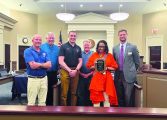By Page H. Gifford
Correspondent
MaryJane Cathers was shopping in a women’s consignment boutique in the Fall of 1993, looking for a warm sweater when she picked up a blue pullover. She recalls stroking it, feeling the soft, wispy fibers beneath her fingers, and that it was weighted like a wool sweater yet felt like silk lingerie. Checking the label it was Nordstrom, 100 percent alpaca. The sweater cost six dollars.
“There was no turning back. I was hooked on alpaca fiber. It never occurred to me at the time that someday I would be tending a herd of these wonderful creatures,” she said.
She developed her passion for alpaca fiber and began to look for it whenever I was starting a new knitting project. The passion for alpacas came 20 years later.
“People ask, ‘What’s so special about alpaca?’ It starts with being hypoallergenic because it has no lanolin. It’s lighter in weight than sheep’s wool, and warmer because the hair is hollow and trap air,” she said. “It’s highly water repellent and fire resistant. I use alpaca shoe inserts in my boots when I’m working outdoors in the winter. They keep my feet warm, regardless of the coldness of the ground or the weather.”
The inspiration began in 1982 when Cathers and her husband purchased 28 acres of open land in Fluvanna County. They had planned to move to Fluvanna after they both retired in the late ‘90s, with the idea that they would farm some of the 28 acres.
“Life has a way of changing the best-laid plans. My husband was diagnosed with dementia in 2004. By 2010 those plans were shelved as he regressed, and I moved further into being primary caregiver.” By the end of 2013 they moved from Northern Virginia to Fluvanna County. Her husband passed away two years later.
A year before her husband died, Cathers was visiting the Alpaca Boutique in Gordonsville, and saw an ad for a two-day seminar at a nearby alpaca farm titled Everything You Need to Know to Raise Alpacas. She attended the seminar, and after doing a bit more research purchased their first four alpacas, two males and two pregnant females. The alpacas were boarded for the first three years while getting the farm infrastructure in place. In June 2017, Cathers’s 14 alpacas finally arrived at their new home.
Last Halloween, one more alpaca was born, bringing the herd number to 15. Making up the herd are eight males and seven females. Her gelded male is a fiber-only animal the other six males are breeding age. The youngest male is 10 months old and will not be breeding for another two years.
Cathers calls her farm Sacred Acres at Wildwood. Her late husband named the farm for the section of Fluvanna County (Wildwood Farm subdivision). It was originally a 158-acre farm, subdivided into housing lots in the early ‘80s.
“I searched for several months for a name that would show my commitment to living a spiritual life – that’s always a work in progress – as well as honor my husband’s original name for our farm. The name works for me because I feel called to be living this life, raising alpacas, and inviting the public to visit this little piece of paradise in the middle of Fluvanna County.”
Five acres, of the 28 acres are open pastures, farm buildings, and the house. The remaining 23 acres are wooded and have numerous named trails through them where visitors can walk in the quiet green serenity of the farm’s woods and along Ballenger Creek which is their eastern boundary.
“They can also bring a lunch with them to eat at one of our three picnic areas. Some visitors have called this a “magical place,” and it is – a set-apart place to come and enjoy and relax.”
Shearing, happens around March-April each year, and Cathers bags up the prime fiber, which comes from the back and sides of the alpaca, and takes it to Shenandoah Fiber Mill in Fairfield to be processed into yarn and roving. Roving, a long and narrow bundle of fiber, is usually used to spin woolen yarn. The shorter, coarser fleece can be used for filling, felting, shoe inserts, or dryer balls.
They regularly do demonstration of processing raw fleece by skirting (removing hay, dirt, grasses), washing, drying, and carding (getting fibers to all run in the same direction) as part of family tours. For anyone interested in learning the crafting from the raw fiber to the finished product, there are fiber workshops, including spinning, weaving, knitting, crocheting, needle felting and wet and dry felting and a weekly needlework group (knitting and crocheting at any experience level).
Cathers, like many contemporary farmers, are conscious of the scarce resources and delicate balance in the current environment and seeks to farm in a way that preserves the land for future generations. She explains that there are advantages to owning an alpaca farm.
Alpacas, part of the camelid family which includes the Asian camel and the llama, originate from South America and are bred from the wild Vicuna which is now a rare and protected species. They have two padded toes with toenails, not hooves, which means they have low environmental impact on the land. Alpacas are grazing animals. When grazing on grass, they cut the grass using a figure-eight motion with their mouth. They do not pull the grass out of the ground.
One unique feature of alpacas is their “community dung piles,” unlike most farm animals,
they do not drop manure all around the pastures and paddocks.
“They pick one or two places and all the alpacas in that area use the same dung pile, making cleanup a bit easier.”
Land management is important, not only for maintaining the herd but for the environment as well. They practice rotational grazing and seeding and re-seeding pastures with orchard grass to improve quality of forage materials for the animals. She maintains the herd size to no more than seven animals per acre, which limits their future herd size to 25-30 animals since there are only five acres of open land for pasture use. She also adds that they keep farm refuse and activities far from open streams to avoid pollution and use only non-toxic and organic formulas when herbicides or pesticides are needed. This is only a fraction of what it takes for Cathers to manage a sustainable farm.
For Cathers, it was a life choice and a second career and she sees a future for farms like hers. But she wants those considering such a venture to understand that it isn’t about showing, stud fees or a profit margin on fleece, it’s about a passion for farming and a love and a dedication to the animals she cares for and the resulting product.
“It’s not a get-rich-quick way of life where you can raise the alpaca, show it, get a good ribbon for the alpaca, and sell the animal based on that ribbon. On our farm we raise the alpacas for their fiber, their gentle nature, and their minimal impact on the environment. We make breeding choices based on temperament, fiber quality, body configuration, and positive genetic traits,” she said.
She says from the standpoint of making a profit, Alpaca fiber is only the beginning.
“As on many farms today, diversification is necessary to at least reach a break-even point financially. Our diversification takes the form of having the property open to the public, by appointment as we reopen under the new COVID standards.”
To meet state and local COVID safety requirements, everyone above age two is required to wear a properly worn face mask while visiting the farm. At the entry point there is a hand-washing station where visitors need to wash their hands. There are also shoe-sanitizing pads that each person will need to stand on to clean the bottom of their shoes (a safeguard for the alpacas).
“We recommend wearing sturdy footwear since the ground can be uneven in places. If you plan to be in the wooded areas, you might consider bringing bug repellent; all the rain we’ve had recently has been a boon for the bug population.”
Tours include meeting and hand feeding the animals and walking the alpacas on a lead. The farm is open to the public for tours as is the farm store, by appointment only. Call (434) 589-2488 to schedule a visit. Tour times are Friday, Sunday and Monday, 10 a.m. to 2 p.m.
They will also be open for the annual National Alpaca Farm Days, a free event, on Sept. 26-27, 2020. No tours or alpaca walking will be done during the event, but visitors will be able to meet and feed the alpacas. Look out for Farm Days on their Facebook page, Sacred Acres Farm at Wildwood, and for more information, visit their website at www.sacredacresfarm.com.




